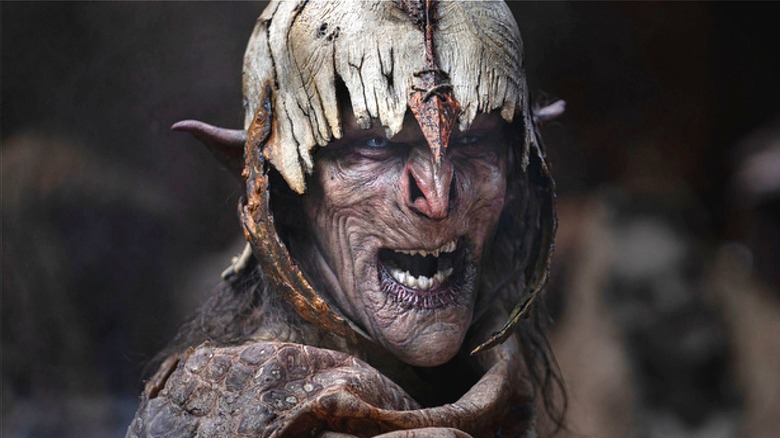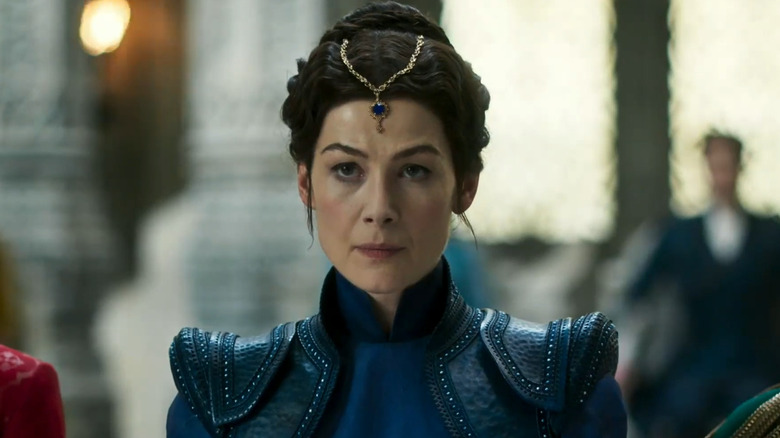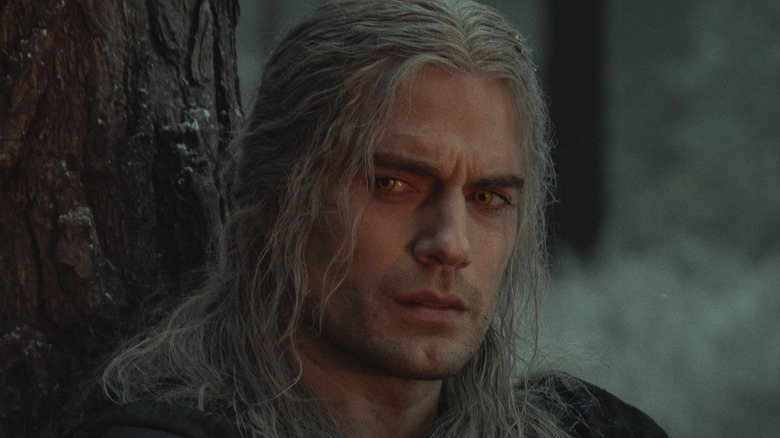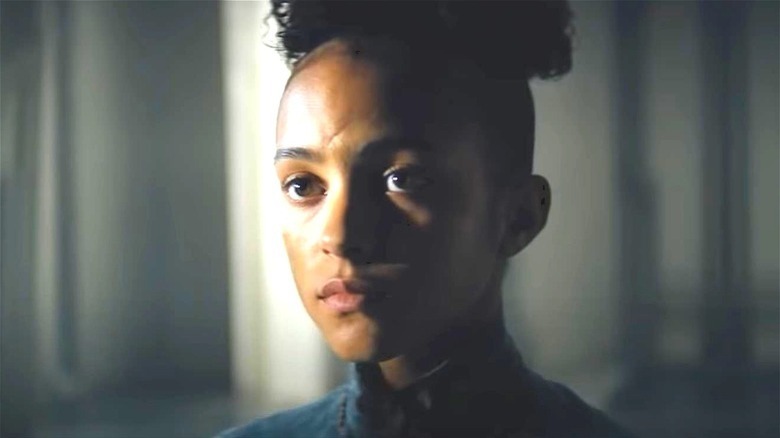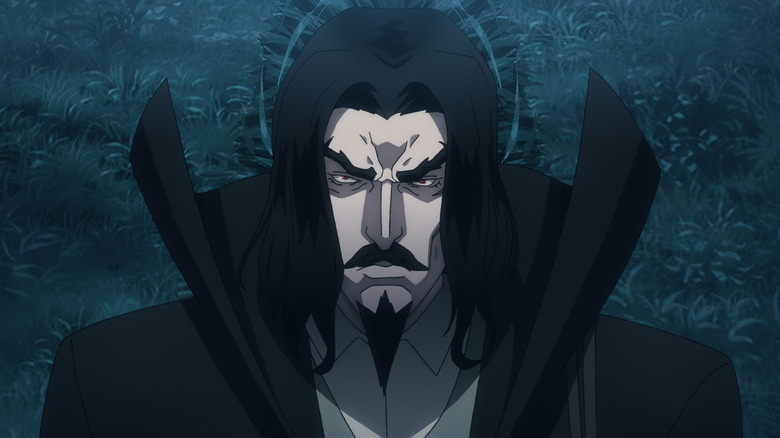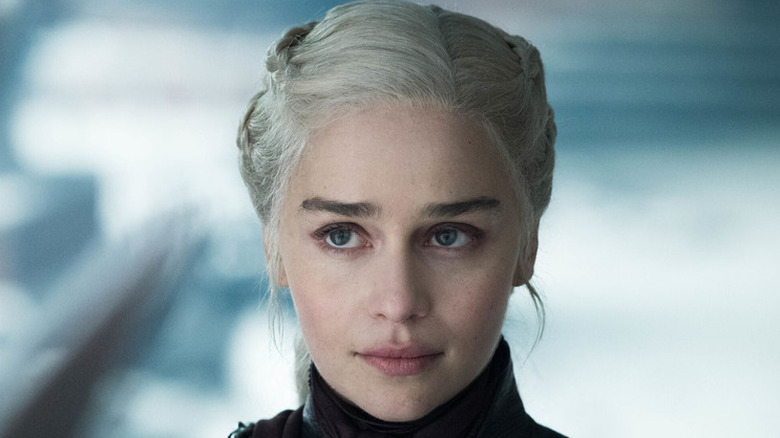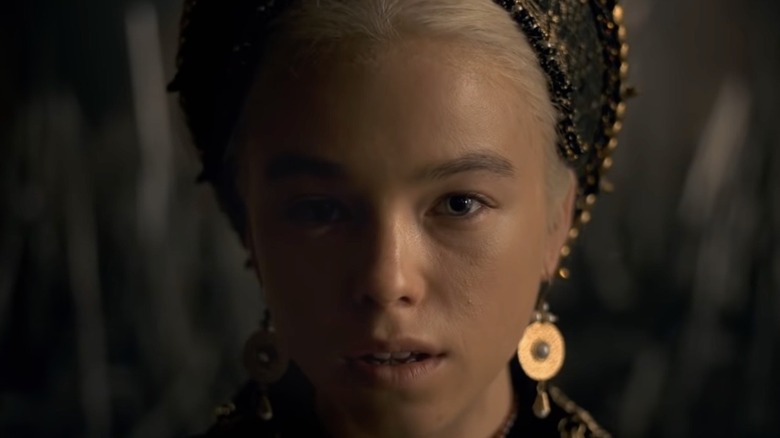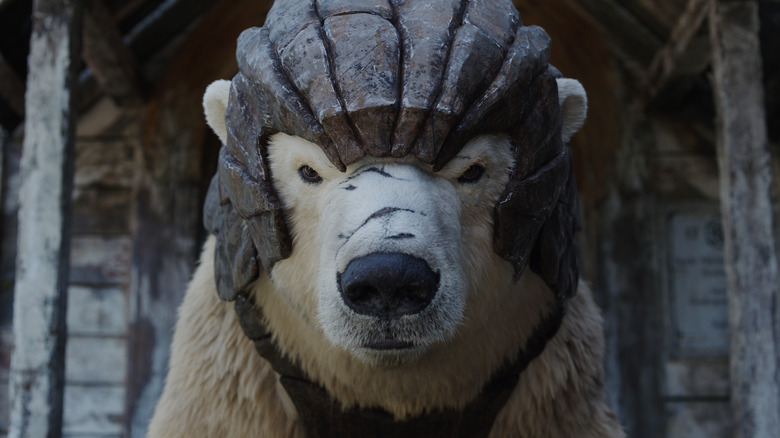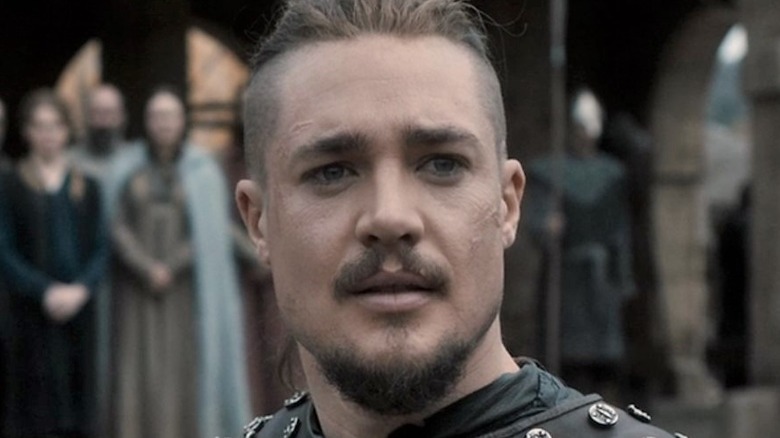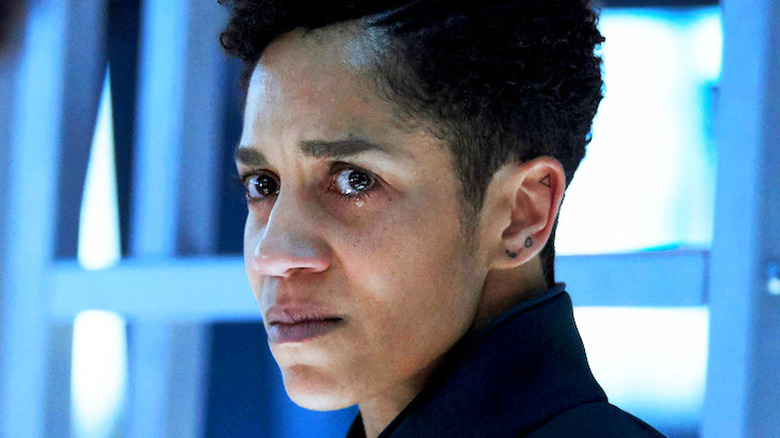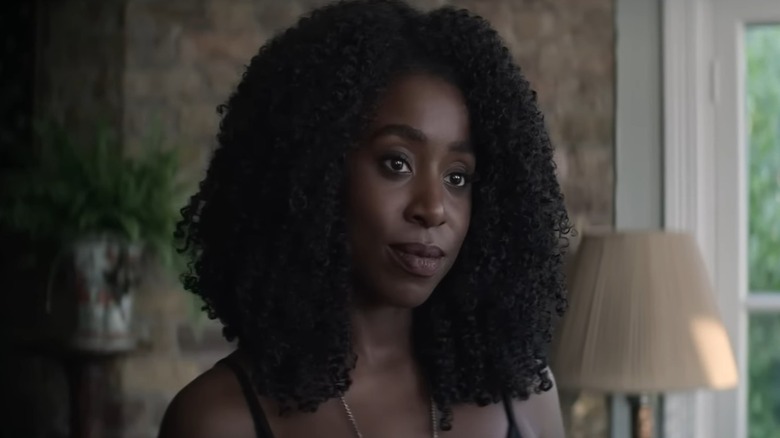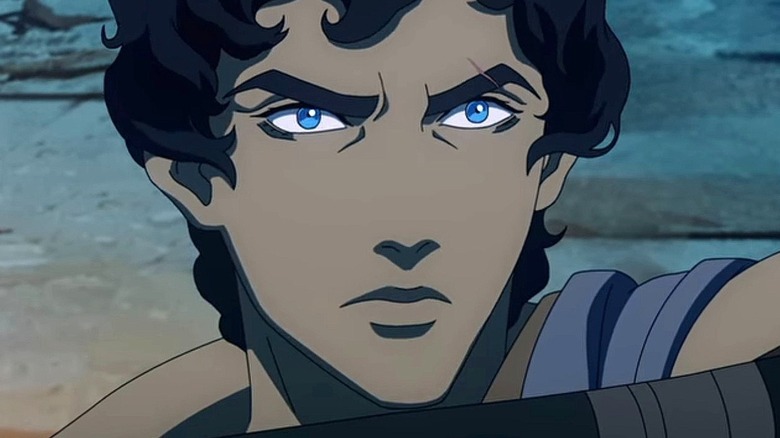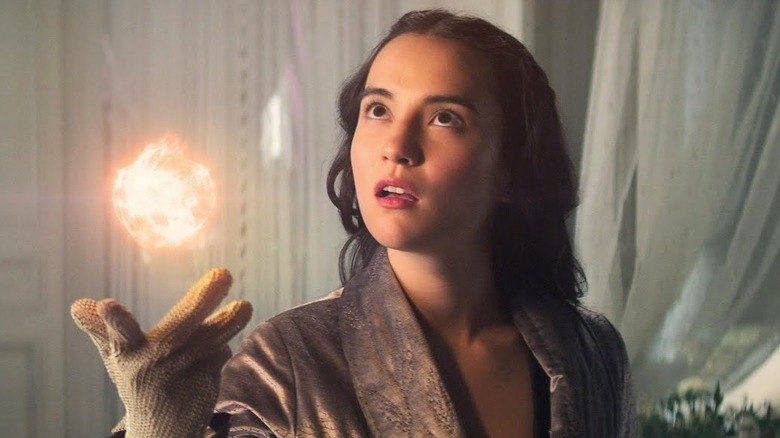12 Shows Like Lord Of The Rings: The Rings Of Power That Fans Should Watch
J. R. R. Tolkien's trailblazing fantasy world has once again been brought to vivid life in Amazon's "The Lord of the Rings: The Rings of Power" — a show that's broken records with its massive budget. Following the huge critical and commercial successes of Peter Jackson's film adaptations, the Amazon series reaches even further back into the history of Middle-earth to the Second Age — a period written about by Tolkien in texts like "The Silmarillion" and "Unfinished Tales."
The Second Age of Middle-earth is a period of great turmoil, seeing world-shaping events like the fall of Númenor, an island nation inhabited by King Aragorn's ancestors, the long-lived Dúnedain. As the title of the Amazon series suggests, the Second Age also sees the forging of the Rings of Power — artifacts that end up causing all kinds of conflict and upheaval across the land. And of course, the Dark Lord Sauron ascends to prominence and power during the second age, following the banishment of his master Morgoth from the physical realm.
While no fantasy world can serve as a full substitute for Tolkien's, there are a lot of other great shows that scratch the same itch. Many of their stories have been directly inspired by Middle-earth, but they've managed to rise as compelling and entertaining in their own right as well. From animated epics and high fantasy sagas to works of science fiction, here are some great shows like "The Lord of the Rings: The Rings of Power" that you should check out.
The Wheel of Time
"The Lord of the Rings" isn't the only famous fantasy franchise that Amazon has adapted for the small screen. In 2021, the streamer premiered the first chapter in "The Wheel of Time," an epic live-action saga based on the highly acclaimed and influential novels by Robert Jordan and Brandon Sanderson. While not quite as expensive as "The Rings of Power," "The Wheel of Time" is still an enthralling and strikingly produced fantasy series with a ton of rich lore and history to explore.
The series follows Moiraine Damodred (Rosamund Pike, who also produces), a member of an all-female order of magic users called the Aes Sedai who work to keep peace in their fantastical realm. That peace is threatened when an ancient evil known as the Dark One attempts to escape his ages-old prison, prompting Moiraine to search for the reincarnation of a legendary hero called the Dragon.
Driven as much by philosophy as it is by action and intrigue, "The Wheel of Time" is truly an epic. It shows a world constantly in cyclical motion — one where sci-fi technology has existed but been lost to time. Jordan clearly pulled a lot from the works of Tolkein, so "Lord of the Rings" fans should feel right at home. But make no mistake — this is still a unique fantasy story with a lot of surprises up its sleeve.
The Witcher
One of the most popular fantasy franchises of the modern era is undoubtedly "The Witcher," the gritty saga created by Polish fiction writer Andrzej Sapkowski. Raised to global prominence in large part thanks to the wildly successful video games from CD Projekt Red, the story of Geralt of Rivia is now also a live-action Netflix series starring Henry Cavill.
At first glance, the Continent of "The Witcher" might seem to have a lot in common with Middle-earth. And to be fair, there's truth to that. There are elves, monsters, ancient mythical creatures, fantasy racial tensions, and kingdoms that are constantly at odds. But the version of Sapkowski's world that's shown in the Netflix series is a lot more focused on ground-level events than "The Lord of the Rings." Nearly every episode sees the mutant monster hunter Geralt travel to a new town, where he must unravel some unsettling mystery and eventually take down a dangerous beast. There's lots of world-building around the edges of the show, especially in the storylines of the other two main characters, Princess Ciri (Freya Allan) and the sorceress Yennefer of Vengerberg (Anya Chalotra). But the meat of the show is found in the most lived-in corners, rather than in some big-picture fantasy plot.
If a more episodic approach to high fantasy sounds appealing, or if you just want to watch Henry Cavill chew scenery like a lawnmower, "The Witcher" is definitely worth a watch.
Foundation
Isaac Asimov's "Foundation" is not high fantasy. It's a sci-fi epic with no elves but an array of space truckers, galactic emperors, and scientists. Despite the different genre, however, Asimov's world has a lot in common with Tolkien's Middle-earth, and that world is brought to life beautifully in the live-action adaptation on Apple TV+.
Like many of Tolkien's lesser-known tales of Middle-earth, "Foundation" is a fictional history told in dramatic fashion. Asimov's novels span hundreds of years, chronicling the collapse of the seemingly invincible Galactic Empire and the "dark ages" of interstellar turmoil that follow. A scientist named Hari Seldon (Jared Harris in the show) uses a complex system called psychohistory to predict this collapse, prompting him to create the Foundation — an isolated human colony meant to wait out the fall of civilization and aid in its resurrection. Of course, things don't exactly all go as planned.
The 2021 series adapts Asimov's story faithfully, albeit with some changes here and there. Like "The Lord of the Rings: The Rings of Power," it's a story on a massive macro scale — one where the characters matter, but where the world at large matters even more. It's a tale of hubris, perseverance, the nature of myth, and the corrupting effect of power on those who wield it. And it's all realized gorgeously with a stellar cast and an Emmy-worthy audiovisual presentation.
Castlevania
If you're looking for epic fantasy with a classical literary bent, the animated saga "Castlevania" may be right up your alley. Though it's based on the popular video game series from Konami, the Netflix series pulls just as much from Bram Stoker's "Dracula" and other older gothic tales, crafting a grim and grisly world of demons, vampires, violence, and revenge.
Set in Eastern Europe in the mid-1400s, "Castlevania" chronicles Dracula's vengeful war on mankind after the murder of his human wife at the hands of the Church. His army of vicious night creatures is contested by a trio of heroes: Trevor Belmont, the last son of a disgraced demon-hunting family; Sypha Belnades, a powerful magic user; and Alucard, the half-human son of Dracula who believes his father's war goes against what his mother stood for.
Aside from the stunning animation and intense action (both of which are reason enough to check the show out), "Castlevania" stands out because of its elegant and complex writing. Every character, be they a villainous member of Dracula's war council or a one-scene traveler who aids the heroes, is treated with nuance, to the point that you may occasionally catch yourself quietly supporting Dracula's genocidal war. The series grapples with complicated themes of humanity, morality, and familial obligation, all while showing the slow and painful decline that uncured rage can affect in even the strongest people. The world is very different from Middle-earth, but that doesn't mean that "LotR" fans won't enjoy "Castlevania."
Game of Thrones
Even after a final season that soured many viewers, "Game of Thrones" remains one of the most popular TV series of the 21st century. That's understandable when you take into account how lauded and talked about the series was for the seven seasons prior, and how influential it's been in the realm of prestige TV since. Warts and all, "Game of Thrones" is still one of the most gripping and best-looking shows you can watch, and it's an easy recommendation for any fan of Tolkien.
At this point, the plot of "Game of Thrones" has become a pillar of modern pop culture. Even if you haven't seen the series, you're likely still familiar with characters like Daenerys Targaryen and Arya Stark. You may even be familiar with some of the details of George R. R. Martin's exquisitely detailed fantasy world — a place where magic has become myth, and where backroom political dealings holds half the drama. From undead-ridden frost lands to barren plains of horse-borne warlords, Westeros and Essos are the kinds of places that can instantly transport you the second the soundtrack starts booming in the background.
The ending is definitely a slap in the face, but the show is simply too good for most of its run to not recommend. From the massive and massively talented cast to the detail on every castle keep, breastplate, and banner, "Game of Thrones" is a spectacle unlike any other. Just don't get too attached to the characters, because most of them will die.
House of the Dragon
At face value, "House of the Dragon" has a lot in common with "The Lord of the Rings: The Rings of Power." Both shows adapt historical lore from their respective franchises — George R. R. Martin's "Fire & Blood" and Tolkien's expanded histories of Middle-earth. Where "The Rings of Power" serves as a sort of prequel to Peter Jackson's films, "House of the Dragon" chronicles the reign of House Targaryen nearly 200 years before the events of "Game of Thrones."
Is it as good as its predecessor? That's up for some debate, but there's no questioning the production value of "House of the Dragon." Like "Game of Thrones" before it, the series realizes Westeros in staggering detail and grandeur. Few franchises have the power to enrapture that "A Song of Ice and Fire" has, nor the power to shock with violent twists. "House of the Dragon" continues that legacy by telling the story of Rhaenyra Targaryen (Emma D'Arcy), the first woman set to take over the Iron Throne. Of course, things are never so simple in Westeros, and a complicated web of allegiances and schemes slowly sows discord within the realm's greatest family.
There are dragons. There are betrayals. There are scenes of abject brutality and malice that will likely make you avert your eyes. And of course, there's a great cast at the center of the story, featuring the likes of Matt Smith, Paddy Considine, Eve Best, Steve Toussaint, and Graham McTavish.
His Dark Materials
While not quite as influential or well known as "The Lord of the Rings," Philip Pullman's "His Dark Materials" trilogy is doubtlessly one of the biggest fantasy series of the modern era. The novels have historically been marketed to children and young adults, but Pullman's story of parallel universes, magic, adventure, and growing up is one that any fantasy fan can appreciate. And for those who'd rather watch than read, there's the excellent live-action adaptation starring the likes of Dafne Keen, James McAvoy, Lin Manuel Miranda, and Andrew Scott.
The show follows Lyra (Keen), a young girl from a realm similar to our own who discovers a secret government conspiracy that pushes her into a dangerous adventure across realities. It's a coming-of-age story that touches on themes of tyranny, oppression, freedom, and faith. The nature of Pullman's universe allows for a lot of creativity and diversity in the fantasy worlds explored, and they're all brought to life with stunning vibrancy.
"His Dark Materials" is a classic fantasy adventure that's appropriate for most ages, and if you're a fan of rich world-building and literary themes — key traits of Tolkien's work — you'll be right at home with this HBO series.
The Last Kingdom
Sometimes, history can be as transportive as actual fantasy, especially when it's embellished with a healthy helping of fiction. Such is the case with "The Last Kingdom," a medieval saga set in 9th-century Europe and based on the novels by Bernard Cornwell.
"The Last Kingdom" follows Uhtred, son of Uhtred (Alexander Dreymon) — a Saxon who's kidnapped by Vikings as a child and raised by Danes — on a long quest to reclaim his family home of Bebbanburg. That journey takes him through a wide range of conflicts with both the Saxons and the Danes, during which Uhtred must make and break tenuous alliances to protect his family and keep his dream alive. The show definitely sacrifices historical accuracy in favor of entertainment value at times, but it's undeniably a fun ride, and the production values are high enough to appease all but the most well-read historians.
If you crave the fantasy world-building, grandiose scale, and mythos of "The Lord of the Rings," then "The Last Kingdom" may end up falling a bit short. Its universe only goes as far as medieval England and Scandinavia (more or less), and its concerns are more personal and political than Tolkien's creation myth scope. But if all you're really looking for is some great sword-and-shield action, pretty costumes, and lovable characters, "The Last Kingdom" has everything you need.
The Expanse
You'll find no wizards in "The Expanse" — the acclaimed live-action show based on the novel series of the same name — but you will find a dense and fully realized world full of fragile governments, secret plots, and great characters. Fantasy stans who don't travel in the realm of science fiction might be better off letting this one float by, but it's an easy recommendation for anyone who loves world-building and the sci-fi genre.
Set centuries in the future, "The Expanse" shows a human race that's colonized the rest of our solar system, leading to a fractured political climate comprised of Earth, Mars, and the more distant settlements. It's an interesting setting because in the grand scheme of sci-fi, it's pretty grounded, only reaching a bit outside of Earth's orbit to build its futuristic universe. That tight focus helps "The Expanse" immensely, allowing it to dive deep into every corner of the story and show each of humanity's extraterrestrial ventures in great detail. The characters take center stage here, and they each have a lot of time to grow and develop.
Gritty and industrial, "The Expanse" has more in common with sci-fi names like "Firefly" and "Alien" than with more grandiose fare like "Star Trek" or "Foundation." It stays grounded, even in zero gravity, and it's an easy recommendation for any fan of high-quality genre TV.
The Sandman
Like "The Lord of the Rings," Neil Gaiman's "The Sandman" pulls heavily from classical myth and folklore, as well as from religious texts like the Bible, in order to construct its fantasy world. The original DC comics have been praised for their massive influence and literary complexity, and the live-action Netflix adaptation brings the original story's grandeur to life with shocking effectiveness.
The story follows Morpheus (Tom Sturridge), the anthropomorphic embodiment of dreams, on a quest to rebuild his ethereal kingdom after being imprisoned by a cult leader for close to a century. Dream's journey takes him to Hell and back (literally) and sees him interact with a number of curious characters, including the rogue nightmare Corinthian (Boyd Holbrook) and Dream's sister Death (Kirby Howell-Baptiste).
As a whole, the show is a bit inconsistent. Some episodes act as one-off vignettes that explore interesting philosophical questions, like the value of mortality or the danger of the truth. Others operate in a more traditional big-picture fantasy way, building out the mythos of Dream, his realm, and the other Endless — Dream's siblings who represent other aspects of human experience. As a result, the series can feel a bit uneven, but it never drags long enough to make you lose interest. The range of material keeps things aesthetically and thematically fresh, and the dialogue is brought to life brilliantly by the show's phenomenal cast.
Blood of Zeus
Who doesn't love a little Greek mythology? "Blood of Zeus" takes Olympus, Hades, and the other corners of ancient mythical Greece to Netflix in animated splendor, telling the tale of the demigod Heron (a new character created for the show) on a journey to save the world. The usual suspects abound around him, like Apollo, Artemis, Ares, Hera, and of course, Zeus himself.
The series debuted on Netflix in 2020 and immediately garnered high critical praise for its gorgeous animation, stellar voice cast, and novel take on Greek folklore. The story employs many of the same tropes that mythology fans will know from the old legends — deadly quarrels between the gods, old sins coming back to haunt Olympus, and human heroes rising up in times of need. Beyond the narrative hooks, there's a lot of visceral animated action to watch, which makes the most of the show's divinely powered characters.
While different from "The Lord of the Rings: The Rings of Power" in many ways, "Blood of Zeus" is still a story about hidden evils and the hubris of those in power. And on top of all that, it just looks great.
Shadow and Bone
The world of Leigh Bardugo's "Shadow and Bone" looks a lot different than Tolkien's Middle-earth — or any other traditional high fantasy realm, for that matter. That's because Bardugo tosses out the traditional Medieval Europe inspiration favor of Imperial Russia, building her story in a land with muskets and technology that stops just shy of full-blown steampunk.
Lore-wise, though, "Shadow and Bone" is perhaps most similar to "Avatar: The Last Airbender." In the books and the Netflix show, certain humans called Grisha are imbued naturally with magical powers, allowing them to control specific elements. Jessie Mei Li plays Alina Starkov, a Grisha with the mythical ability to control light. That power makes her central to a plot to destroy the Shadow Fold — a thin sliver of pure darkness that cuts the world in two.
The story also features plenty of monsters, tyrants, witch hunters, and underworld power brokers, crafting a vivid world rich with history, lore, and danger. Add a little romance, a fantastic ensemble cast, and some of the most striking aesthetics Netflix has ever produced, and you have yourself a fantasy epic worthy of all the praise it's received.
